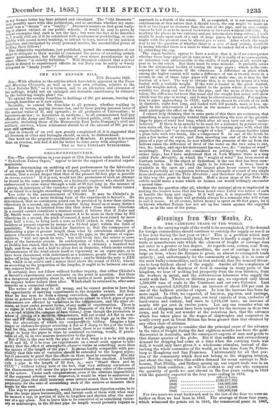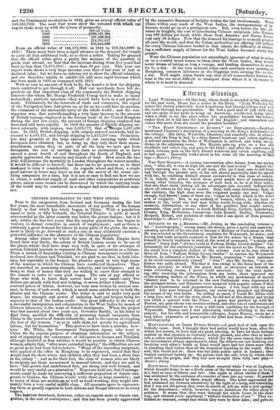diruniugs from Cut Snuks kr.
THE CARRYING TRADE OF THE WORLD.
For two years we went backward, and in the last of the four we were no farther on than we had been in 1845. The average of these four years, which witnessed the potato rot in 1846, the commercial panic in 1847, How is the carrying trade of the world to be accomplished, if the demand for foreign commodities should continue to outstrip the supply as much as ' it has done during the last year or two ? This is a problem which may well puzzle many a mercantile head, for there is hardly a single branch of trade or manufacture into which the element of freight or carriage does not enter in a greater or less degree. As regards corn, cotton, coal, flour, iron, wood, and other bulky commodities, the cost of carriage is so very large an item, where the distance is great, as almost to extinguish trade entirely ; and, unfortunately for the community at large, it is in some of the most bulky commodities, such as iron and coal, that the demand threat- ens to keep farthest ahead of the supply. Amidst all the complaints of dull trade which the dearness of food is causing in many parts of the kingdom, we hear of nothing but prosperity from the iron districts, from the workers in metal, and the subterranean labourers who supply the world with fuel. Twelve or thirteen years ago, we exported only about 1,300,000 tons of coals to the Continent and our own Colonies. Last year, we exported 3,636,621 tons ; an increase of about 170 per cent in one of the bulkiest articles of export. In iron the increase has been far more rapid. In 1840, we exported, of bar-iron, pig-iron, and castings, 204,406 tons altogether ; last year, our total exports of iron, exclusive of hard-wares and cutlery, had risen to 1,018,148 tons; an increase of nearly 400 per cent in twelve years. Let any one consider what an amount of shipping must have been required for the increase in theme two items, and he will not wonder at the notorious fact, that the advance which has taken place in the wages of shipwrights and carpenters in nearly every port in Great Britain has been greater than that obtained by any other class of artisans. Most people appear to consider that the principal cause of the advance in the rates of freight during the last eighteen months has been the gold- discoveries in Australia, and the consequent exports of men and goods to that distant quarter of the globe. But if that sudden and extraordinary demand for shipping had come at a time when the carrying trade wait dull, it would only have given it a wholesome stimulus, instead of dis- turbing the whole commerce of the world, as it has done from St. Peters- burg to Hongkong and San Francisco. Unfortunately for all that por- tion of the community which does not belong to the shipping interest, just about the time when this sudden demand for ocean carriage to Mel- bourne, Port Phillip, and Sydney sprang up, our export trade was in an unusually brisk condition ; as will be evident to any one who compares
the quantity of goods we sent abroad in four years ending in 1849 with the quantity exported in the four years ending in 1852.
'Tears. Official Value.
1845 £150,877,902 1846 148,609,066 1847 146,172,008 1848 160,996,048
and the Continental revolutions in 1848, gives an annual official value of 149,163,7531. The next font years show the rebound with which our export trade went up with the return of prosperity.
Years. Official Value.
1849 $190,101,394 1850 197,330,261 1851 214,391,017 1862 219;645,699 From an official value of 146,172,0081 in 1846 to 219,545,699/. in 1852 ! There must have been a rapid advance in the demand for vessels to carry all that additional bulk, at so short a notice. Taking for granted that the official value gives a pretty fair measure of the quantity of goods sent abroad, we find that the increase during those five years had been no less than 73,373,6911.; more than 50 per cent. This year our export trade shows a very large increase over that of last year in real or declared value ; but we have no returns yet to show the official valuation, and are therefore unable to exhibit the still more rapid increase which has been made in 1853 as compared with 1852.
With so vast an amount of work to do the wonder is how the shipping trade contrived to get through it all. Had Our merchants been left de- pendent on that important class of the community the British shipping interest—for whom Mr. George Frederick Young used to make so many melancholy, patriotic speeches—they would have been in a sad predica- ment. Fortunately for the interests of trade and commerce' the repeal of the Navigation-laws had given us, so far as we could hire its services, the command of the mercantile navy of the whole world ; and the con- sequence was, that notwithstanding a very large increase in the amount of British tonnage employed in the foreign trade of the United Kingdom during the last few years, the amount of foreign shipping employed has increased still more rapidly. In 1848 the amount of B itish shipping en- tered outwards, with cargoes, was 3,553,777, that ofIlteign 1,497,460 tons. In 1852, British shipping, with cargoes entered outwards, had in- creased to 4,459,321, and foreign shipping to 2,413,260 tons. Protection- ists may grumble at the large amount of our carrying trade which foreigners have obtained, but, in doing so, they only show their unrea- sonableness, seeing that, in spite of all the help we have got from foreigners, the cost of carriage has risen so enormously as to have caused a great dearth of coal throughout the South of England, and greatly aggravated the scarcity and dearth of food. How much the two evils will increase the mortality in London throughout the winter months, it Would be difficult to foretell, but there can be no question as to their tendency to raise it considerably. As regards wheat and flour, a single good harvest at home may leave us less at the mercy of the ocean car- rying companies for a time, but it is not so easy to find out how we are to obtain a sufficient supply of coals and other commodities at moderate prices, unless some means can be discovered by which the carrying trade of the world may be conducted in a cheaper and more expeditious man- ner.



































 Previous page
Previous page